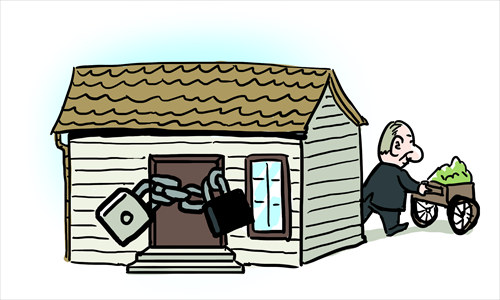Western sanctions policy may result in boost to Russian modernization

Illustration: Liu Rui/GT
World tensions are increasing as Washington's policy of confrontation against Russia intensifies. President Barack Obama has underscored US intentions in a revealing interview with The Economist as well as in remarks during his Africa summit.
Obama left no doubt that he is committed to a global hegemonic foreign policy based on intervention, and emphasized the US is the "one indispensable power" which will go to war to support Western "ideals and international rules."
In practice, US global interventionism takes several forms. It can be undertaken unilaterally, with allies in formal alliance structures, or in loose "coalitions of the willing."
Obama's continuation of the interventionist policies of the George W. Bush administration is no surprise despite campaign rhetoric promising "change." Recent polling data shows the American people emphatically reject a policy of intervention and unnecessary wars.
The Economist interview demonstrates that the Cold War mindset has not been put aside by Obama. Bloc thinking remains integral to Washington's foreign policy establishment. The former "free world" versus communist world confrontation is superseded by the "democracies versus non-democracies" confrontation.
When it comes to Russia policy, the White House has been clear about its policy of confrontation. Russia is portrayed as a non-democracy with a dictatorial ruler who is intent on aggression and who does not play by so-called Western rules.
Obama's disparaging comments on Russia indicate that he is poorly advised. On a basic topic, he incorrectly stated that demographic trends are negative when in fact they are presently positive. While stating that Russia does not attract immigrants, he omitted the fact that tens of thousands of refugees from the Ukraine are seeking refuge in Russia at this time.
The president made it quite clear that US policy remains ranged against nationalist and patriotic forces in Russia which he called a harmful "deep strain" in Russia. Indicating a lack of cultural understanding, he disapproved of Russia's historic mix of Western and Eastern orientations as "Janus like."
US policy for a number of years aimed against Vladimir Putin in an attempt to split the Russian leadership. Washington played up to Dmitry Medvedev in an attempt to isolate Putin.
Washington's transparent game supports so-called Western-oriented Russian policymakers against patriotic and nationalist policymakers. Efforts to foment a "color revolution" are part of this clumsy political warfare.
The president's negative comments on the Russian economy failed to recognize strengths in the science and technology sector. Although the manufacturing sector needs an update, this can be accomplished by closer relations with countries such as China.
Western-imposed sanctions against Russia may well have the effect of spurring the modernization of the Russian manufacturing sector as Moscow adopts a policy of import substitution, alternate sourcing, and cooperation with both established and new partners.
Moscow's response to Western economic warfare has been restrained, but US and European businesses will begin to feel the bite, not only in the manufacturing sector, but also in the agricultural sector.
Modernization of Russia's agricultural and food processing sectors can have positive benefits for the nation. Alternative sourcing of agricultural imports from BRICS countries as well as from Chile, Argentina, Ecuador, and Mexico is already under discussion and will strengthen solidarity and cooperation.
As Russia strengthens its own domestic production capabilities and undertakes alternate sourcing for imports, traditional Western suppliers involved in economic warfare against Russia will inevitably lose market share. It may well not be possible for them to regain market share.
Washington's new cold war against Russia will fail, and US allies foolish enough to go along with irresponsible and counterproductive policies will also lose as global tensions rise.
Notwithstanding the West's geopolitical delusions and military interventionism, the general trend of the present era is a desire for peace and development.
Obama's interview in the Economist suggests he must find a new team of advisors and reflect carefully on his legacy.
The author is an educator and former senior professional staff member of the Senate Committee on Foreign Relations. opinion@globaltimes.com.cn